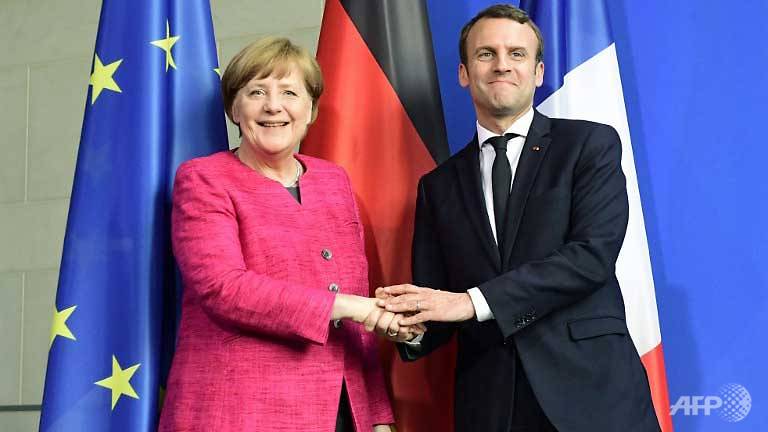Macron, Merkel vow new momentum for Europe
 |
| German Chancellor Angela Merkel (L) and French President Emmanuel Macron shake hands after talks at the chancellery in Berlin. (Tobias SCHWARZ/AFP) |
Macron, the fervently pro-European centrist sworn in as head of state on Sunday, in keeping with tradition made his first trip abroad to Berlin, its power couple partner at the heart of the European project.
There, the 39-year-old leader urged a "historic reconstruction" of Europe to battle populism sweeping the continent, following his defeat of far-right leader Marine Le Pen.
Merkel, in power for a decade, agreed the two core European powers wanted to give "a new push" to their cooperation and "new momentum" to the Franco-German axis.
"There is a common understanding that we can't just focus on Britain leaving the EU but that, first and foremost, we have to think about how we can deepen and crisis-proof the European Union, and especially the eurozone," she said at a joint press conference.
Ahead of his visit, Macron's ideas on reforming the eurozone - including setting up a separate budget, legislature and finance minister for the currency bloc - had sparked scepticism in Berlin.
Finance Minister Wolfgang Schaeuble had warned that such deep-reaching reforms would require EU treaty changes, which were "not realistic" at a time when Europe was hit by a surge of anti-euro populism.
But Merkel left the door open, saying that "from the German point of view, it's possible to change the treaty if it makes sense", while Macron also said that there was "no taboo" on this issue.
Macron also soothed German concerns over the mutualising of "old debt" between eurozone countries, saying he does not favour the idea of so-called eurobonds, but adding that he was open to sharing future burdens.
REDRAW MAP
Earlier Monday in Paris, Macron named centre-right lawmaker Edouard Philippe as prime minister in a further effort to splinter the country's traditional parties and redraw the political map.
Philippe, a little known 46-year-old MP and mayor of the northern port of Le Havre, comes from the moderate wing of the right-wing Republicans party and is seen as a pragmatist.
His appointment was seen as a strategic move by Macron, who is trying to woo modernisers of all stripes to his new centrist party, the Republique en Marche (Republic on the Move, REM), having already won over dozens of moderate Socialist MPs.
Former investment banker Macron, who trounced Le Pen in the May 7 presidential run-off, aims to take votes from both the Republicans and Socialists in next month's crucial parliamentary election.
Philippe has been presented as his Trojan horse on the right of the spectrum.
Taking over from outgoing prime minister Bernard Cazeneuve during a short ceremony, Philippe described himself as "a man of the right" who was driven by "the greater good".
'BREAK THE RIGHT'
Like Macron, Philippe is a product of France's elite ENA college who once worked in the private sector and has little truck with the country's fraying left-right divide.
Relatively unknown outside his northern fiefdom, he has never served in a national government.
After campaigning for Socialist prime minister Michel Rocard as a youth, he switched to the right, becoming a close ally of centre-right former prime minister Alain Juppe.
The German-speaking father of three, who writes crime novels in his spare time, was elected to parliament in 2012.
Juppe on Monday praised him as "a very talented man".
His appointment is a further blow to the Republicans, who have been trying to regroup after the presidential vote and prevent defections to Macron's camp.
POLITICAL TRANSFORMATION
Republicans secretary-general Bernard Accoyer said there were no immediate plans to expel Philippe from the party but that he would have to "clear up the ambiguity" about his loyalties.
Some in the party have argued in favour of an alliance with Macron.
Around 20 MPs on Monday issued a statement urging the Republicans and centre-right UDI to "accept his outstretched hand", saying the right needed to "take the full measure of the political transformation taking place before their eyes".
Macron needs a majority to push through his ambitious plans to loosen France's strict labour laws, boost entrepreneurship and reduce class sizes in tough neighbourhoods.
But his year-old party faces a battle for seats, with the Republicans, Le Pen's National Front, the radical left and other losers of the presidential election all plotting revenge.
Leftist firebrand Jean-Luc Melenchon said that Philippe's appointment as premier showed the right had been "annexed" by the tentacular Macron.
What the stars mean:
★ Poor ★ ★ Promising ★★★ Good ★★★★ Very good ★★★★★ Exceptional
Latest News
More News
- Russian President congratulates Vietnamese Party leader during phone talks (January 25, 2026 | 09:58)
- Worldwide congratulations underscore confidence in Vietnam’s 14th Party Congress (January 23, 2026 | 09:02)
- Political parties, organisations, int’l friends send congratulations to 14th National Party Congress (January 22, 2026 | 09:33)
- 14th National Party Congress: Japanese media highlight Vietnam’s growth targets (January 21, 2026 | 09:46)
- 14th National Party Congress: Driving force for Vietnam to continue renewal, innovation, breakthroughs (January 21, 2026 | 09:42)
- Vietnam remains spiritual support for progressive forces: Colombian party leader (January 21, 2026 | 08:00)
- Int'l media provides large coverage of 14th National Party Congress's first working day (January 20, 2026 | 09:09)
- Vietnamese firms win top honours at ASEAN Digital Awards (January 16, 2026 | 16:45)
- ASEAN Digital Ministers' Meeting opens in Hanoi (January 15, 2026 | 15:33)
- ASEAN economies move up the global chip value chain (December 09, 2025 | 13:32)
















 Mobile Version
Mobile Version